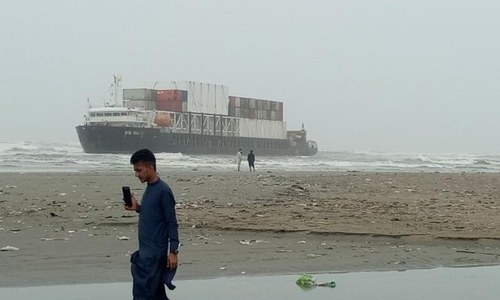KARACHI: The massive rupee devaluation amid the highest-ever freight charges have substantially increased the landed cost of raw materials causing supply chain disruptions, hurting industrial production and turning finished goods more expensive.
The rupee-dollar exchange rate that had attained stability at Rs152-153 in May from an all-time high of Rs168.40 in August 2020 has now again risen to Rs167 in the interbank market.
In addition to this the soaring freight charges on account of port congestion, shortage of ships and containers resulting in long delays in arrival of goods from abroad have pushed up the cost of production.
Mashood Ali Khan, a manufacturer-cum-exporter of auto parts, said shipment delays and an increase in freight charges have drastically increased the production cost, thus affecting supply chain of auto parts manufacturers while additional freight prices would be passed on to the customers.
Earlier a shipment from Qingdao port took 25 days with freight charge at $2,000 per 20-feet container; now it takes almost 60 days and $9,000 per box, he said.
From Thailand now it takes 35 days against 25 and freight cost increased to $4,500 from $800 per 20-feet container. The freight price from an Indonesian container was $3,200 and now it is $11,000 and the shipping time was 35 days; now it takes 50 days, he added.
Mr Khan said this is just a small glimpse of the bottlenecks the supply chain for any industry is facing. The biggest dilemma is that the entrepreneur cannot forecast what would happen in the next six months.
He said increase in sheet metal price by Rs98 per kg from January 2020 till to date coupled with rupee devaluation and rising freight charges has pushed up manufacturing cost by 15-20 per cent in the one year.
I.H. Qamar, former chairman of Pakistan International Freight Forwarders Association, said freight rate for a 20-feet container from China is now $4,000 versus $600-700 a year back while a 40-feet container now costs $6,500 as against $1,500.
Giving an example on exports, he said freight charges for Pakistani products to the USA are $8,000 as compared to $2,000 while for the UK they are $6,500 as compared to $1,000 a year back.
Commodity expert and Convener Pulses Standing Committee of the FPCCI Anis Majeed said the rupee devaluation since May has pushed up the landed price of imported commodities. Pulses rates have crawled up $50-75 dollar in the world market in the last three months whose impact of Rs10-70 per kg in wholesale rates have been passed on to the consumers.
He said container shortage, enforcement of standard operating procedures at various ports followed by quarantine of ships’ crew at few Chinese ports earlier this month are causing shipment delays of 15-20 days all over the world. A year back, container ships used to get clear in two to three days.
Pakistan Hosiery Manufacturers and Exporters Association Chief Coordinator Jawed Bilwani said textile exporters are flooded with orders till March/April, but shipping issues and higher freight charges are creating problems.
Published in Dawn, September 5th, 2021















































